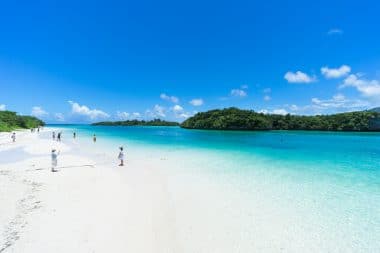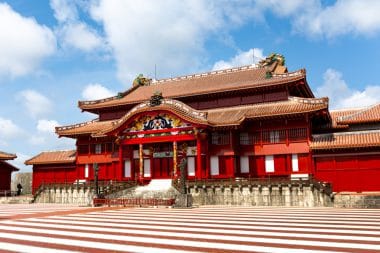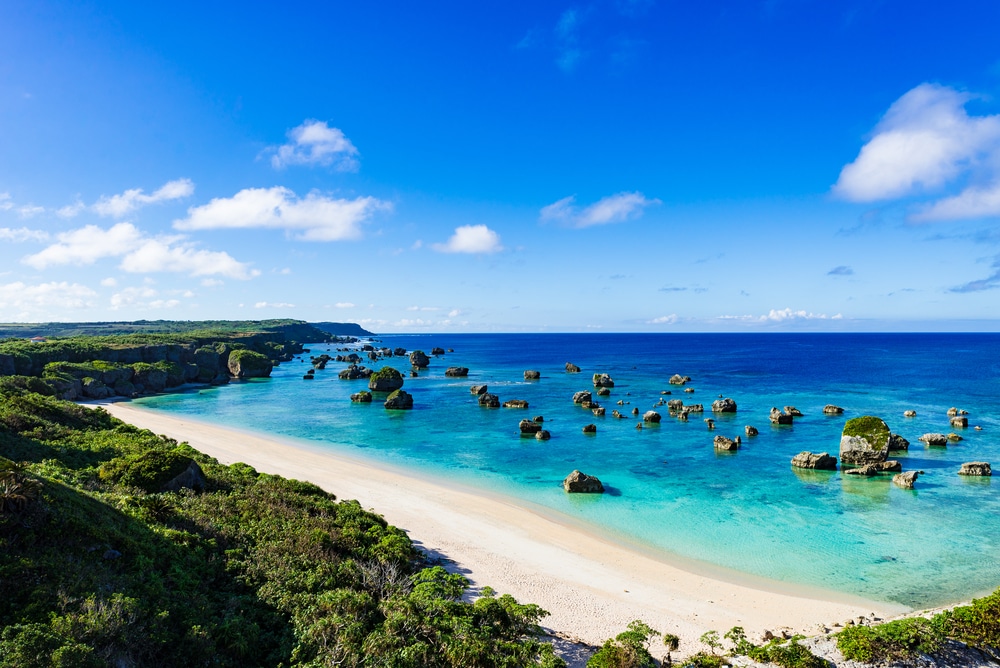While Europeans on the Balearic Islands or Canary Islands enjoy good offers and the summer heat year after year, the Japanese are drawn to a completely different group of islands. The Okinawa Islands are not only the vacation paradise of the Japanese population, they have also become an insider tip for Western vacationers in recent years. Here, the opportunity for a beach holiday meets the typical Japanese culture that is praised in so many places in Western Europe. By the way, the Ryukyu Islands (Ryūkyū) get their name from a part of Japanese history that has left its mark everywhere in this little paradise today.
Ryukyu Islands – the Japanese don’t know this name
What the European gets advertised as Ryukyu Islands in some brochures or on one or the other website is usually not even a term for the Japanese. This is because the name of the archipelago is very different in modern times, and the former tribes and empires that ruled here no longer play a major role even in current Japanese culture. Therefore, these islands are usually equated with a specific name: Okinawa. It is only a part of the said archipelago, but has long since developed into the paradise par excellence for the Japanese. Here they get something like the flair of Hawaii, without having to leave their own and ancestral culture.
The problem with the name can also be found in political and diplomatic history. On the one hand, the islands have changed their names several times, and on the other hand, there is no fixed assignment which of the many small islands can be assigned to the Ryukyu archipelago at all. However, this should not stop a holidaymaker from dealing with this archipelago, after all, it stands out from the typical Japanese mainland and from the general culture of the country in general.
Over 90 percent of the inhabitants of this archipelago are located on Okinawa and accordingly a large part of the activities take place here. But that doesn’t mean you shouldn’t take a trip to the less populated islands. Here you will find not only large and small treasures of history, but also various opportunities to spend your own free time or to experience something away from the big strongholds. But what should you actually have seen on the Ryukyu Islands?
The main attractions of the Ryukyu Islands & Okinawa
Okinawa and the Ryukyu Islands break out of the well-known cliché of Japan , which is more oriented towards German temperatures and therefore has little tropical proximity. The Japanese islands are located on the edge of the climate zones and especially with the warming in recent years, Okinawa has developed into an almost subtropical paradise for vacationers from all over the world – but especially from Japan .

On the one hand, this means that Okinawa’s many white beaches are of course the first stop for anyone dreaming of a vacation by the sea. Everywhere there are beautiful sections that are suitable for recreation or sports. The tourism industry is well developed and thus the archipelago differs significantly from the destinations in Japan, which mainly focus on a cultural holiday of the most diverse forms. But also for those who want to discover a little more, there are a wide variety of destinations.
The most important sights give a clear indication of what kind of high culture must have once ruled over the islands. This may not seem so important among all the other activities today, but all the temples and fortresses are the original heritage – from a time when the island certainly didn’t attract holidaymakers to the beaches. Here is a small list of the most important sights:
- Shurijo Castle: One of the most important castles in the archipelago that once protected the entire region. It is now a World Heritage Site and is undoubtedly one of the most important sights.
- Nakagusuku Castle: Another castle that has also been awarded the title of World Heritage Site and also provides a good insight into the architecture of the Japanese Middle Ages.
- Sefa Utaki Rock Cave: Once the holiest site of the Ryukyu Kingdom, this rock cave is now open to the public.
- The Royal Gardens of Shikinaen: These wonderful gardens extend over 25,000 square meters and not only invite you to take a long hike, but also tell a lot about the native flora and fauna.
Of course, these are just a few examples of the things you should have visited in the Ryukyu Islands. It is the mixture of traditional sights and opportunities for your very own holiday that make this area an interesting address for more and more holidaymakers. This is also evident when you take a look at the other possible activities that can be found here.
And what can you do in the Ryukyu Islands?

The islands are home to one of the last rainforests in the Western Hemisphere. The forests of Yakushima may not be home to monkeys and deadly snakes, but they do contain evidence of the pristine biotope that has made these forests so special. With due respect, holidaymakers should enter it and be surprised by the beauty of nature in these forests. With a regional guide, you will also learn a thing or two about the flora and fauna of Japan, which is sometimes so different from that of the Western world.
Tours by boat are also available through the forests and landscapes of the Ryukyu Islands. Together with the appropriate expert guides on site, you can discover the various sights that nature offers in this region of Japan. The history, culture and special features of the island are told, offering a deep insight into the life that Okinawa and the other Ryukyu Islands have to offer. The best way to finish is of course in a regional restaurant, where you get to see a little more of the culinary idiosyncrasies. Either way, the Ryukyu Islands offer every holidaymaker the right amount of culture and relaxation – whatever the people in the region are looking for at that very moment.
Holidays in Okinawa: Important information
Important telephone numbers
- Emergency numbers: 110 (police), 119 (fire and rescue service)
- German Embassy in Tokyo: +81 3-5791-7700
- German Consulate in Osaka: +81 6-6440-5070
Doctors
- Dr. Kazuya Nishizawa: Nishizawa Clinic, 1-9-1 Mihama, Chatan, Okinawa, +81 98-926-1100
- Dr. Hidekazu Matsuo: Matsuo Clinic, 3-1-12, Uechi, Okinawa City, Okinawa, +81 98-937-7505
Important words with translation
- Hello – こんにちは (Konnichiwa)
- Thank You – ありがとう (Arigatou)
- Please – お願いします (Onegaishimasu)
- Yes – はい (Shark)
- No – いいえ (Iie)
- Sorry – すみません (Sumimasen)
- Where is…? – … はどこですか? (… wa doko desu ka?)
- How much does it cost…? – いくらですか? (Ikura desu ka?)
- Emergency – 緊急 (Kinkyū)
- Doctor – 医者 (Isha)
- Hospital – 病院 (Byōin)
Holidays
- New Year’s Day: January 1
- Adult celebration: Second Monday in January
- National holiday: February 11
- Day of the beginning of spring: 20th or March 21
- Green Day: 4 May
- Children’s Day: May 5
- Sea Day: Third Monday in July
- Mountain Day: August 11
- Day of the Elders: Third Monday in September
- Day of Sportsmanship: Second Monday in October
- Culture Day: November 3
- Labor Day: November 23
- Emperor’s birthday: February 23
Opening hours
- Shops: Usually daily from 10:00 to 20:00.
- Supermarkets: Usually daily from 9:00 a.m. to 10:00 p.m., some 24 hours.
- Restaurants: Lunch from 11:00 to 14:00, dinner from 17:00 to 22:00.
- Banks: Monday to Friday from 9:00 a.m. to 3:00 p.m.
Airport
- Naha Airport (OKA): 4 km west of Naha, the capital of Okinawa
NUDISM
- Uncommon in Japan: There are no official nudist beaches in Okinawa.
Post / Stamps
- Post Offices (Yūbin-kyoku): In all major cities. Opening hours: Monday to Friday from 9:00 a.m. to 5:00 p.m.
- Stamps: Available at post offices, kiosks and vending machines.
- Costs for letters and postcards to Germany: Standard letter up to 25g: approx. 110 JPY; Postcard: approx. 70 JPY
Safety
- Crime: Okinawa is considered safe. Nevertheless, as everywhere: Pay attention to personal belongings, especially on beaches and in tourist areas.
- Emergency number: 110 (police), 119 (fire and rescue service)
Current
- Voltage: 100 volts
- Sockets: Type A and B (US standard). Adapter required for European plugs.
Tip
- Unusual: In Japan, no tip is expected. Outstanding service is taken for granted.
Customs
- Allowances within the EU: No customs restrictions on personal belongings.
- Alcohol: Maximum 3 bottles (760 ml each).
- Tobacco: 400 cigarettes, 100 cigars, 500g tobacco.
- Other items: Value up to JPY 200,000 duty-free.


